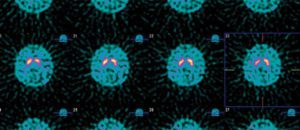

Nearly 1 million people in the U.S. have this chronic and progressive disorder. The average onset of Parkinson’s disease is around 60 years of age. Approximately 100,000 Americans are diagnosed with Parkinson’s disease each year. Its onset is typically seen around 60 years of age, 15% of those diagnosed are under the age of 50.
Although the cause is unknown, the main effect of Parkinson’s disease is the cell death of neurons in the substantia nigra area of the brain. Neurons are nerve cells that produce the neurotransmitter, dopamine, which sends signals to the brain that controls movement and motor skills. In the brain of a person suffering from Parkinson’s disease, dopamine is significantly decreased as the disease progresses. In Parkinson’s disease, dopamine transporters (DaT) in the brain decline significantly. Dopamine transporters control the flow of the neurotransmitter dopamine between nerve cells. A reduction of DaT interrupts the communication and messaging between nerve cells and the transport of information from the brain to the muscles causing the symptoms of Parkinson’s disease.
Radiology Regional performs DaTscan, which is a nuclear medicine exam used to detect signs of Parkinson’s disease within the brain.
DaTscan is a specific type of a SPECT scan (single-photon emission computed tomography). It is instrumental in diagnosing the dopamine transporter levels in the brain that signal Parkinson’s disease. Measuring DaT levels using DaTscan provides practitioners with precise functioning of the brain.
The DaTScan SPECT utilizes a scanner to track an injected radioactive agent. Once in the bloodstream and the brain, the scan can detect cells that react to the injected agent. A distinct pattern can be seen on the image in patients with Parkinson’s disease, and it can also measure the progression of the disease.
The Radiology Regional Difference
Countless radiology centers use third-party radiologists that are not onsite and sometimes, not even in the same area. At Regional Radiology their radiologists are onsite and even more important, they are the most comprehensive group of fellowship-trained radiologist to include women’s Imaging, MSK (musculoskeletal), body, neuroimaging, cardiac imaging, and interventional radiology.
Radiology Regional has 12 locations to serve you, and they are all accredited by ACR and ICANL. At these convenient locations, they can accommodate same-day, walk-in x-rays, and scheduled appointments. When you arrive, the welcoming environment is different than larger, hospital-owned facilities and the knowledgeable staff works with you one-on-one to make you comfortable, and to plan you for your test. But it doesn’t start there. Radiology Regional begins its personalized attention when they schedule your appointment to make certain that you are well-prepared ensuring the best results and outcomes. The intricate imaging isn’t rushed or taken lightly. Each patient receives care as if they were family.
Radiology Regional Center Offers
• ON SITE RADIOLOGISTS
• Certified Technologists
• ACR Accredited Mammography
• ICANL (Intersocietal Commission for the
Accreditation of Nuclear Medicine Laboratories)
• Same Day Appointments and Exam Availability
• Courtesy Calls For Abnormal Results
• 24-48 Hour Report Turn-Around for Referring Physicians
• Stat Reports on Request for Referring Physicians
• Courier Service For Film Delivery when Necessary
• Knowledgeable, Courteous and Bilingual Staff
• Accept Most Insurance, Auto and Workers Compensation
• Participate With Most HMO’s & PPO’s
• Contracted Lower Rates
Ask your physician to refer you to Radiology Regional Center for your imaging needs or call 239.936.4068 to schedule your Virtual Colonoscopy.
239-936- 4068
www.radiologyregional.com
 Southwest Florida's Health and Wellness Magazine Health and Wellness Articles
Southwest Florida's Health and Wellness Magazine Health and Wellness Articles

